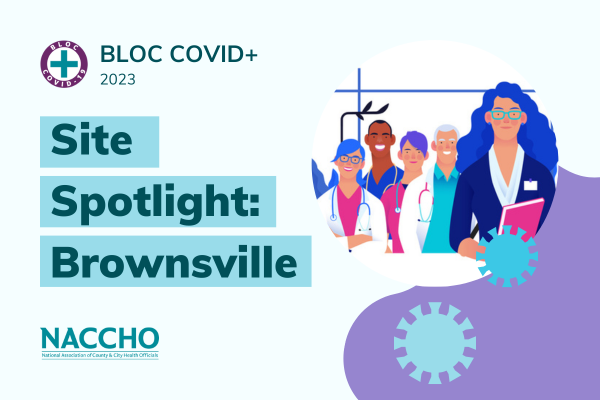The Building Local Operational Capacity for COVID-19, Healthcare-Associated Infections, and Antimicrobial Resistance (BLOC COVID-19+) project continues and expands upon the first year of the BLOC COVID-19 Demonstration Site project by allowing LHDs to go beyond COVID-19 response and address other HAIs and AR pathogens.
The goals of the BLOC COVID-19 + project are to:
- Strengthen relationships between LHDs and facilities and partners;
- Enhance LHD capacity and confidence in assessing and supporting infection prevention and control (IPC) practices in high-risk facilities;
- Improve implementation of IPC in high-risk facilities; and
- Decrease rates of and negative outcomes associated with COVID-19, HAIs, and AR pathogens in those facilities.
We asked our BLOC COVID+ sites to reflect on their experiences and lessons learned since joining our project. Here is what one of our sites, Brownsville, shared with us. A standalone version of their blog post can be found here.
Forging Partnerships in the Pandemic
“Developing a partnership with a subject matter expert (SME) is a crucial step in establishing a new program. It is of paramount importance to ensure that there is an SME for each aspect of the program, as staff may not have the experience or the knowledge to identify where and how programmatic gaps or pitfalls can be avoided. Depending on the scope and capacity of the program, one [subject matter expert (SME)] may suffice, or multiple SMEs may be necessary as the knowledge and skillsets of professionals at the Public Health Department may not be adequate to deliver the appropriate level of expertise for program implementation. This was the case for the City of Brownsville (COB) Public Health Department, as more than one SME was deemed necessary to launch the Building Local Capacity (BLOC) COVID-19+ program.
During the COVID-19 pandemic, the city of Brownsville developed a working relationship with the University of Texas Health Houston School of Public Health (UTH SPH) and the Department of State Health Services (DSHS). As the pandemic moved into the endemic phase of disease spread, the COB Public Health Department made the strategic decision to increase the scope and capacity of the Epidemiology and Surveillance division by proactively working to gain a foothold in long-term care facilities (LTCF) and tackle healthcare-acquired infections (HAI) through infection prevention and control (IPC). To further that aim, it was crucial to engage our pandemic partners and ask for their assistance as we moved into this new field. Dr. John McCormick and Dr. Sue Fisher-Hoch from UTH SPH were asked to be our SMEs from the academic sector. They would cover all aspects dealing with training criteria and ensure we had the most authoritative resources at our fingertips for academic rigor and delivery of materials. We also partnered with DSHS Region 11 Epidemiologist Angel Guevara and Infection Control Practitioners Carlos Mendoza and Amanda Barton to be the SME for all things implementation and delivery related. They would advise on state regulations and expectations and provide guidance on how to have our messaging and delivery coalesce.”
Establishing Subject Matter Experts (SMEs) to Guide Programmatic Efforts
“Our initial first steps were to establish each of these individuals as SMEs. Dr. McCormick and Dr. Fisher-Hoch were formally established through a Memorandum of Understanding, and the DSHS team was jurisdictionally established. This would entail defining parameters for expectations for each party and how to execute those expectations. Afterward, open communication was established, and a project management timeline was established internally. The front end of the program development would lean heaviest on the academic and training materials development, while the implementation and delivery would span the back end of the project timeline. At each of these stages, our SMEs collaborated and supported the development of the program. Their expertise was called upon throughout the program development to ensure the COB Public Health Department was prepared with the tools needed to educate and train local LTCFs. This could be a clarification on questions regarding disease spread and transmission routes, or best practices when encountering hesitant staff during an Infection Control Assessment and Response (ICAR) activity.
The amount of information, foresight, and mentorship each of our SMEs provided while executing this new program was immeasurable. The COB Public Health Department was able to confidently move through the process thanks to the creation of a team of highly experienced SMEs.”



